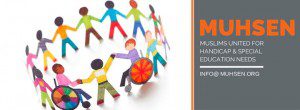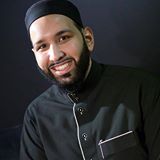Editors’ Note: This article is part of the Public Square 2014 Summer Series: Conversations on Religious Trends. Read other perspectives from the Muslim community here.
By Joohi Tahir
Sure enough, they start to stare. Even more than the children, it’s the adults who are staring. Sadly, this is a typical reaction to individuals with disabilities who “dare” to enter our mosques. It’s not that they’ve never seen a person with special needs individual before — they surely have. It’s that fear, that uncertainty, of what to say, what to do with them.
This is the reality that so many special needs families have experienced themselves or have heard about, causing the majority to stay away. Isn’t the mosque meant to be the center of the community, or so it was hundreds of years ago? A meeting place, a place for connecting and making friends and well as for worshipping. Today in America, Muslims with special needs and their families find themselves much farther away from this notion and plagued with a feeling of alienation, loneliness and despair.
Our families with “special” loved ones deserve to have access to faith, we all do — but especially these precious “People of Jannah,” who pure and many sinless, unaccountable, as once described by one of our scholars. (Sh. Omar Suleiman). Why should others judge the way disabled individuals worship? Why should their faith be made to feel insignificant? They should be welcomed with a smile, a greeting of salaam (peace) and made to feel comfortable.
Why does it matter? Because families are suffering and individuals with special needs are not getting the support they should. As a mother of three daughters, one of whom is on the autism spectrum and is non-verbal, displaying many outward characteristics of the disorder, our family is unable to enjoy family time at the mosque. What if she acts out? Makes loud vocalizations or gets hyper and runs around? Why don’t the other kids/youth volunteers want to help out with her? How will we concentrate on our salat (prayers)? What about a community dinner or fundraiser? Where will she sit? Who will watch out for her?
These events are all off our radar, making us unMosqued to a great degree.
Why Special Needs Families Become UnMosqued
I realized quite recently, when trying to form a parent support group in my area for parents of special needs kids, that most of them did not strive to be a part of the masjid. Each of them had had an unpleasant experience in the past and was not made to feel welcome. Therefore, they never returned. They simply had no place for the mosque in their lives, and an ideal mosque didn’t exist.
My unpleasant experience took place when my daughter was eight years old. We took her to a hajj program that other children had put together. That evening, another mother who sat nearby keenly observed my daughter, and her reaction to my sweet, smiling, peaceful child was to move her daughter away — as if to move her from harm, from something contagious she would catch. Is this Islam folks? And, if these are our adults, what hope do we have for their kids?
After that experience, my daughter, who is now 14, hardly returned to the community mosque.
Is awareness the answer? Yes, in part along with a great deal of education about what our faith teaches us about inclusion, kindness and these special beloved individuals to God. More than ever, we should study other faiths and how they are embracing this population with special services and caretakers and respite help in their houses of worship and Sunday Schools.
There are many good ideas passed around, but in my experience, they are not implemented. Many are well-intended, but disability inclusion is not taken seriously and is not a priority in our mosques today. All it takes is dedication and love.
With this in mind, I am proud to be part of a new organization called MUHSEN (Muslims United for Handicap and Special Education Needs), founded by Sh. Omar Suleiman, scholar, director and instructor from Dallas, Texas. (ILF Texas, Al-Maghrib) Sh. Omar has a vision and passion for the way model mosques should be — a welcoming “special friendly” place.
If an individual is affected by a disability, whether emotional, physical or neurological, the challenges and difficulties are felt first by them, and then all those around them — family, siblings, friends and the community at large. This platform will, insha’Allah, help to include all these people and reMosque them.
MUHSEN will strive to advocate, educate, train and implement programs and services nationwide to improve access to mosques for these individuals as well as acceptance and inclusion by the community in all aspects of their daily lives. Implementation is needed, not just awareness.
MUHSEN will work to lead in creating a better understanding of disabilities in our communities and building a better future for individuals with special needs — where they are welcome, all their needs are addressed and they are accepted by all. Individuals with disabilities are growing in numbers, and we are in denial if we believe that it does not affect us. Childhood disorders and illnesses are at an all-time high, affecting millions, Muslims included.
MUHSEN plans to develop programs to train youth to become peer buddies, closed captioning displays for the hearing impaired, “quiet” rooms for sensory issues and counseling and support groups by trained professionals. We hope to see a day when we can even have job training and our dear family members can be hired within the community as working contributing members of our society.
Down the road, residential facilities caring for the “Muslim” specific needs, including halal foods and environments, will be key as the Muslim special needs population ages.
MUHSEN will be launched officially at the ISNA Convention in Detroit, a revolutionary idea for our North American mosques. Will your mosque be MUHSEN friendly?
To learn more or to volunteer, contact us at [email protected]. Visit https://www.facebook.com/MUHSENOrg/ for more information. Our website, www.MUHSEN.org, is under construction and will be live soon.
Joohi Tahir is the executive director of MUHSEN and a vice president at Crescent Foods. The founder of MUHSEN is Sh. Omar Suleiman.













